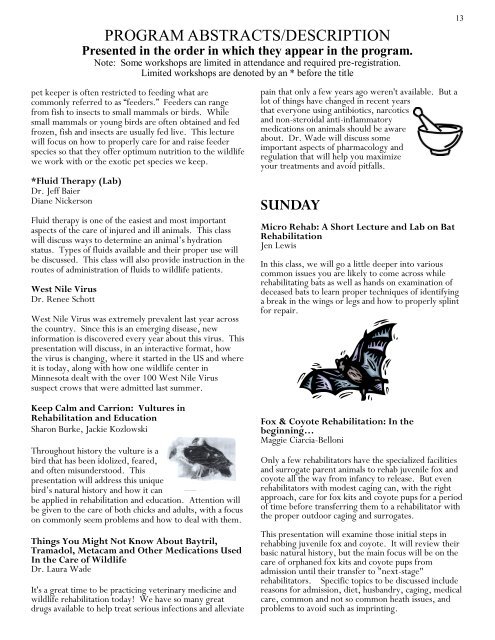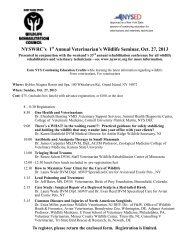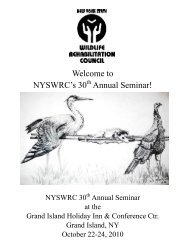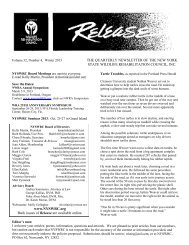Conference Booklet - New York State Wildlife Rehabilitation Council
Conference Booklet - New York State Wildlife Rehabilitation Council
Conference Booklet - New York State Wildlife Rehabilitation Council
You also want an ePaper? Increase the reach of your titles
YUMPU automatically turns print PDFs into web optimized ePapers that Google loves.
PROGRAM ABSTRACTS/DESCRIPTION<br />
Presented in the order in which they appear in the program.<br />
Note: Some workshops are limited in attendance and required pre-registration.<br />
Limited workshops are denoted by an * before the title<br />
pet keeper is often restricted to feeding what are<br />
commonly referred to as “feeders.” Feeders can range<br />
from fish to insects to small mammals or birds. While<br />
small mammals or young birds are often obtained and fed<br />
frozen, fish and insects are usually fed live. This lecture<br />
will focus on how to properly care for and raise feeder<br />
species so that they offer optimum nutrition to the wildlife<br />
we work with or the exotic pet species we keep.<br />
*Fluid Therapy (Lab)<br />
Dr. Jeff Baier<br />
Diane Nickerson<br />
Fluid therapy is one of the easiest and most important<br />
aspects of the care of injured and ill animals. This class<br />
will discuss ways to determine an animal’s hydration<br />
status. Types of fluids available and their proper use will<br />
be discussed. This class will also provide instruction in the<br />
routes of administration of fluids to wildlife patients.<br />
West Nile Virus<br />
Dr. Renee Schott<br />
West Nile Virus was extremely prevalent last year across<br />
the country. Since this is an emerging disease, new<br />
information is discovered every year about this virus. This<br />
presentation will discuss, in an interactive format, how<br />
the virus is changing, where it started in the US and where<br />
it is today, along with how one wildlife center in<br />
Minnesota dealt with the over 100 West Nile Virus<br />
suspect crows that were admitted last summer.<br />
pain that only a few years ago weren't available. But a<br />
lot of things have changed in recent years<br />
that everyone using antibiotics, narcotics<br />
and non-steroidal anti-inflammatory<br />
medications on animals should be aware<br />
about. Dr. Wade will discuss some<br />
important aspects of pharmacology and<br />
regulation that will help you maximize<br />
your treatments and avoid pitfalls.<br />
SUNDAY<br />
Micro Rehab: A Short Lecture and Lab on Bat<br />
<strong>Rehabilitation</strong><br />
Jen Lewis<br />
In this class, we will go a little deeper into various<br />
common issues you are likely to come across while<br />
rehabilitating bats as well as hands on examination of<br />
deceased bats to learn proper techniques of identifying<br />
a break in the wings or legs and how to properly splint<br />
for repair.<br />
13<br />
Keep Calm and Carrion: Vultures in<br />
<strong>Rehabilitation</strong> and Education<br />
Sharon Burke, Jackie Kozlowski<br />
Throughout history the vulture is a<br />
bird that has been idolized, feared,<br />
and often misunderstood. This<br />
presentation will address this unique<br />
bird’s natural history and how it can<br />
be applied in rehabilitation and education. Attention will<br />
be given to the care of both chicks and adults, with a focus<br />
on commonly seem problems and how to deal with them.<br />
Things You Might Not Know About Baytril,<br />
Tramadol, Metacam and Other Medications Used<br />
In the Care of <strong>Wildlife</strong><br />
Dr. Laura Wade<br />
It's a great time to be practicing veterinary medicine and<br />
wildlife rehabilitation today! We have so many great<br />
drugs available to help treat serious infections and alleviate<br />
Fox & Coyote <strong>Rehabilitation</strong>: In the<br />
beginning…<br />
Maggie Ciarcia-Belloni<br />
Only a few rehabilitators have the specialized facilities<br />
and surrogate parent animals to rehab juvenile fox and<br />
coyote all the way from infancy to release. But even<br />
rehabilitators with modest caging can, with the right<br />
approach, care for fox kits and coyote pups for a period<br />
of time before transferring them to a rehabilitator with<br />
the proper outdoor caging and surrogates.<br />
This presentation will examine those initial steps in<br />
rehabbing juvenile fox and coyote. It will review their<br />
basic natural history, but the main focus will be on the<br />
care of orphaned fox kits and coyote pups from<br />
admission until their transfer to "next-stage"<br />
rehabilitators. Specific topics to be discussed include<br />
reasons for admission, diet, husbandry, caging, medical<br />
care, common and not so common heath issues, and<br />
problems to avoid such as imprinting.








